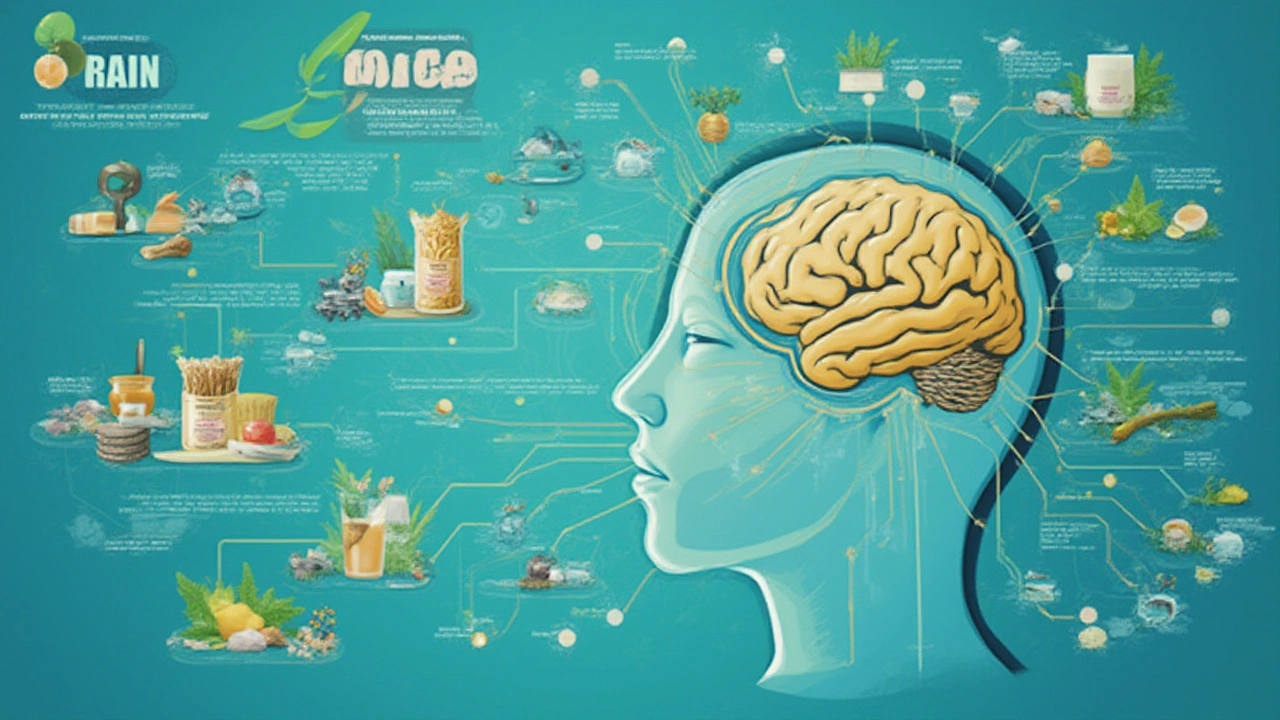How Diet and Nutrition Affect ADHD: What Science Shows and Practical Tips
 Jul, 1 2025
Jul, 1 2025
Picture this: a bowl of sugary cereal in the morning and a restless afternoon at school, or a lunch packed with colorful veggies and a surprisingly focused mindset afterward. It sounds dramatic, but there’s mounting evidence that what we eat can make a real difference for those living with ADHD. Food is fuel, and for brains with ADHD, the kind of fuel matters more than you might think. Small diet tweaks sometimes have a ripple effect—shaping everything from mood to attention span. Don’t expect miracle cures or overnight fixes, but you might be surprised at how some choices on your plate play into your daily focus.
The Link Between Diet and ADHD: What the Research Says
There’s a lot of debate here, but a growing body of studies connects food and ADHD symptoms. For instance, a well-known 2022 meta-analysis in 'Nutrients' reviewed over 40 studies and found that some dietary patterns can either ease or worsen symptoms. Kids with ADHD are often both pickier eaters and more prone to deficiencies in key nutrients—think iron, zinc, and omega-3 fatty acids. Deficiencies in these areas have been tied to irritability, trouble focusing, and impulsivity.
One surprising stat: up to 40% of kids with ADHD might have lower levels of omega-3 compared to their peers without ADHD. This matters, since omega-3s are essential for brain cell health and signaling. Several trials, including a British study in 2020, showed that supplementing omega-3 led to mild improvements in attention and behavior. Not a cure, but definitely a nudge in the right direction.
Then there’s sugar. Contrary to popular myths, high sugar itself doesn’t cause ADHD, but it can make hyperactivity and inattention worse in some children, especially those already sensitive to it. Food colorings and preservatives like sodium benzoate get flagged too. One trial, the Southampton Study, logged greater hyperactivity after kids consumed certain artificial food dyes. So, while not every person with ADHD is affected, enough are that it’s worth watching.
Nutrition also dances with genetics. For example, kids with a certain dopamine transporter gene (DAT1) might get more benefit from a high-protein breakfast. And there’s fascinating research into how gut microbes influence ADHD symptoms, showing that what we eat shapes those microbes. A diverse, fiber-rich diet may help balance these internal ecosystems, possibly leading to calmer mood and better concentration.
| Nutrient | Common Food Sources | Role in ADHD |
|---|---|---|
| Iron | Lean meats, beans, spinach | Supports dopamine production for focus |
| Zinc | Shellfish, seeds, dairy | Regulates mood and impulse control |
| Omega-3 | Fatty fish, flaxseeds, walnuts | Builds healthy neurons for brain signaling |
| Magnesium | Nuts, whole grains, greens | Promotes calm and better sleep |
The takeaway: while diet isn’t the whole story, it’s a key player. The research tilts toward nutrient-dense foods making a noticeable difference for many living with ADHD.
What Foods Help—and Hurt—ADHD Symptoms?
If you have ADHD, thinking about how food affects your day-to-day isn’t just another wellness trend—it’s practical. Some meals seem to hit a sweet spot for brainpower, while others spike energy before crashing it down just when you need to focus for work, school, or chores.
So, what helps? Protein-rich foods are a top pick. Turkey, eggs, tofu, Greek yogurt, and even a handful of nuts can slow blood sugar spikes and keep energy steady. Studies from the late 2010s have confirmed that kids and adults with ADHD who eat a protein-rich breakfast have sharper focus in the morning. And it isn’t only about kids. Grownups see benefits too; a study in 'Appetite' found adults who swapped in more morning protein noticed less scatter-brained energy through their workday.
Healthy fats like omega-3s are basically brain magic. Salmon, sardines, chia seeds, and walnuts help protect brain tissues and aid communication between brain cells. And you don’t need to eat fish every day—researchers say that aiming for two servings a week gives most people what they need. If you’re plant-based, flax and chia seeds, and supplements like algal oil, are solid alternatives.
Whole grains matter, too. White bread and pastries might give a fast burst of energy, but brown rice and oatmeal keep things humming for longer. Whole grains break down slowly, avoiding the peaks and valleys in blood sugar that drag down focus. Plus, these grains feed gut bacteria that play a quiet but important role in mood and cognitive function.
Colorful fruits and veggies give your brain a boost due to antioxidants and fiber. Blueberries, sweet potatoes, and leafy greens show up again and again in diet research on focus and cognition. The trick is variety—rotate your choices to cover all the vitamins and minerals your body needs.
But there are foods that often spell trouble for folks with ADHD. Sugary drinks (yes, even the “natural” fruit punches), white sugar, and high-fructose corn syrup all cause mood and attention whiplash for some people. Some processed meats and packaged snacks pack preservatives like sodium benzoate or food dyes. While not everyone with ADHD notices a change, if you’re sensitive, these ingredients can add fuel to the fire of inattention or hyperactivity.
- Steer clear of sugary cereals and sodas at breakfast
- Swap out chips and cookies for roasted chickpeas, or apple slices with nut butter
- Check food labels for synthetic colors like FD&C Yellow 5, Red 40, and sodium benzoate
ADHD isn’t a one-size-fits-all condition. You might love carrots and hate fish, or notice no impact from food dyes at all. Chart your symptoms and food habits for a week—you could spot patterns you never expected.

Practical Strategies for Mealtimes with ADHD
Life with ADHD can feel like living in fast-forward. Cooking elaborate meals, prepping three course dinners, or remembering to thaw that chicken from the freezer? That’s a tall order. The good news is—you don’t need perfection. A few tweaks can carry you far, with no kitchen wizardry required.
Start with the morning meal. Skipping breakfast is easy when you’re distracted or short on time. But regular breakfast supports even mood and steadier focus. Prepping overnight oats with chia seeds, nut butter, or adding hard-boiled eggs to your routine can be a game changer. Try setting up a snack box in the fridge—think carrot sticks, cheese cubes, whole grain crackers—so grabbing something healthy is easier than grabbing a bag of chips.
Meal planning doesn’t have to mean color-coded spreadsheets. Try jotting down three dinner ideas on Monday, then buy those ingredients. If you like, batch cook a big pot of chili or a basic stir fry—these dishes reheat well and let you toss in all sorts of veggies.
Snacking happens a lot with ADHD, mostly because attention wobbles or energy dips. Instead of fighting the urge, keep mindful snacks around: trail mix, Greek yogurt, or banana with almond butter. Setting up positive, easy choices is the trick.
Water matters, too. Dehydration hides behind headaches and crankiness, so keep a water bottle within arm’s reach. You could even jazz it up with lemon, berries, or peppermint leaves. If you struggle remembering to sip, set phone reminders or link drinking water with daily routines—like having a glass right after brushing your teeth.
Eating out? You don’t have to order steamed broccoli every time. Try a grilled chicken sandwich instead of breaded tenders, or swap fries for a salad now and then. It’s about nudging your habits, not rewriting your personality.
- Pick one meal or snack each day to level up—add a veggie, some whole grain, or a side of protein.
- Plan in five-minute blocks: what healthy food can you prep in five minutes?
- Partner mealtimes with an existing habit (like prepping lunch while your coffee brews).
- If you have kids, get them involved; let them pick a new fruit or veggie at the store.
Even minor changes can have outsized benefits, especially over weeks and months. Consistency, not perfection, is your best friend in building habits that support brain health.
Supplements and Special Diets: What’s Worth Trying?
Supplements light up online forums and parent groups everywhere, and the question comes up all the time: can a pill help where food can’t? Short answer—sometimes. But navigating all these options takes a bit of know-how.
Omega-3 supplements probably have the best evidence for ADHD. Multiple well-designed trials since 2018 report that kids and adults with ADHD who took omega-3 (usually a mix of EPA and DHA) for a few months showed mild improvements in attention and impulse control. These effects are smaller than what you’d see from medication, but enough to matter for some folks.
Zinc and iron play their part too. In a 2019 Turkish study, kids with diagnosed deficiencies who got supplements had clear gains in attention—after their doctors checked them for low levels first, of course. Supplementing if you don’t need to probably won’t help, and high doses can cause more problems than they solve.
Magnesium sometimes pops up in the conversation. While the evidence isn’t as strong, a few studies link low magnesium with restlessness, poor sleep, and inattentiveness. Supplements might help if you’re low, but talk with your healthcare provider before adding magnesium to your lineup.
The big headline grabber is elimination diets. Some families swear by cutting out gluten, dairy, artificial colors, or other items. The most-researched is the 'Feingold Diet,' which excludes food colorings, preservatives, and some flavors. About 30% of kids with ADHD seem to get a boost emotionally and behaviorally, usually those who are sensitive to additives. Just know, these diets can be restrictive, so always work with a dietitian to make sure you aren’t missing key nutrients along the way.
What about super-trendy supplements? Creatine, N-acetylcysteine, and certain botanicals get tossed around but lack concrete research. Unless your provider recommends them, you’ll want to focus on nutrients with proven records.
Before trying any supplement, though, test, don’t guess. Ask your doctor to check levels via bloodwork, especially for iron, zinc, and vitamin D. Supplements can interact with ADHD meds or cause tummy upset, so tracking changes after adding something new helps spot benefits—or side effects. If you are taking stimulant medication, caffeine supplements or high doses of certain vitamins can also make you jittery or disrupt sleep.
Diet trends shift every few years, but the staples—protein, healthy fats, micronutrient-rich foods—never go out of style. Just don’t fall for products that promise to "cure" ADHD by food alone.

Customizing Your Plate: Finding What Works For You
ADHD doesn’t look the same for everyone, and diet changes land differently too. What lights up focus for one person might do zip for someone else. So how do you figure out your best bet?
A food and mood journal is a handy tool. Write down what you eat, then add notes about your symptoms that day. Did you zone out during a meeting after a carb-heavy lunch, or breeze through math homework after an egg sandwich? Give it a week or two. Often, patterns pop up that you never noticed before.
Start slow. Instead of revamping your whole pantry, add or swap one thing at a time. Notice how you feel—physically and mentally—after trying a high-protein breakfast, switching your snacks, or skipping an afternoon soda. If you make too many changes at once, it gets impossible to tell what’s helping or hurting.
Family support helps. If your kiddo has ADHD, include them in food planning. Let kids pick out veggies at the store or help assemble snack boxes. Make mealtimes low-stress—no lectures about “bad food,” just honest talk about which foods build strong brains and steady moods. If you’re the one with ADHD, get your roommates or family on board by prepping snacks together or sharing easy recipes.
And don’t stress about perfection. Pizza nights and birthday cake won’t undo progress made with daily nutrition. In the long run, what counts is the rhythm of meals—regular timing, balanced choices, and a routine you can keep up even on wild days.
Sometimes, you’ll hit a wall with food alone. And that’s not a failure. ADHD is complex, and while nutrition wields power, it works best with a mix of strategies—physical activity, sleep, therapy, maybe medication. Still, the right food choices act as a foundation for all those other steps. When your brain gets steady fuel, everything else has a fighting chance to click.
If you ever wonder whether changing your diet is “worth it,” know this: more often than not, people who give it an honest try notice some sort of lift. It might be more consistent moods, steadier energy, or the ability to concentrate just a bit longer. That edge might not solve everything, but for people with ADHD, every bit of extra focus can make daily life feel a lot more manageable.
Mike Rothschild
July 12, 2025 AT 02:25Protein at breakfast changed everything for me. Used to crash by 10am, now I’m steady till lunch. No magic, just eggs and peanut butter. Simple works.
Ron Prince
July 13, 2025 AT 12:58Of course diet matters you uneducated normies. Real men eat steak and ignore all this hippie nonsense. Sugar? Pfft. My grandpa ate candy for breakfast and lived to 92. Science is a cult.
Sarah McCabe
July 14, 2025 AT 08:18Omega-3s are my secret weapon 🌱🐟 I started taking flaxseed every morning and my brain finally stopped feeling like a browser with 50 tabs open. Also, blueberries are underrated. I eat them like candy now 😊
King Splinter
July 15, 2025 AT 10:04Look I get it people want to believe food fixes everything but let’s be real here the whole ADHD diet thing is just another way for wellness influencers to sell you overpriced supplements and organic kale smoothies. I’ve tried every ‘brain food’ under the sun and honestly the only thing that helped was stimulants and sleep. Stop pretending a walnut is gonna fix your dopamine system. It’s not a magic bean.
Kristy Sanchez
July 16, 2025 AT 12:16Oh wow another article telling me I’m broken because I like Pop-Tarts. Congrats. You’ve discovered that sugar makes you feel like a buzzing bee. Shocking. Meanwhile I’m over here with a PhD in ADHD and a pantry full of processed snacks and guess what? I still got my PhD. Maybe your brain just needs less judgment and more chocolate.
Michael Friend
July 17, 2025 AT 10:11This is why society is collapsing. Parents are letting their kids eat ‘whole grains’ and ‘omega-3s’ instead of teaching them discipline. ADHD isn’t a diet problem it’s a character problem. If you can’t focus then you’re lazy. No amount of spinach will fix that. Wake up.
Jerrod Davis
July 19, 2025 AT 08:59While the empirical evidence regarding nutritional modulation of ADHD symptomatology is statistically significant in certain cohorts, it remains insufficiently robust to warrant broad clinical recommendations without individualized biochemical profiling. One must exercise caution against conflating correlation with causation in dietary intervention studies.
Dominic Fuchs
July 20, 2025 AT 01:29Iron and zinc deficiency is real but most people don’t get tested. I had a kid who was diagnosed with ADHD then turned out he was just low on iron. Once he started supplements his teacher said he was like a different child. No meds needed. Funny how we jump to pills before we check the basics
Asbury (Ash) Taylor
July 20, 2025 AT 11:44Consistency over perfection. That’s the mantra. One veggie at a time. One protein-rich snack. One glass of water after brushing your teeth. Small steps build lasting change. You don’t need to overhaul your life - just show up for yourself, one meal at a time. You’re worth the effort.
Kenneth Lewis
July 21, 2025 AT 17:35ok so i tried the omega 3 thing and honestly i dont know if it worked or if i just got lucky but i didnt have a meltdown during my zoom meeting yesterday so maybe?? 🤷♂️ also i spelled omega wrong twice
Jim Daly
July 23, 2025 AT 11:57you guys are overthinking this. just eat less sugar. thats it. no supplements no journals no fancy meals. i stopped drinking soda and boom focus. simple. why is this so hard
Tionne Myles-Smith
July 24, 2025 AT 05:49I started meal prepping on Sundays and now I’m not grabbing chips at 3pm anymore. It’s not perfect but I feel calmer. And honestly? My kid asked me why I’m not yelling as much. That’s the win.
Leigh Guerra-Paz
July 24, 2025 AT 21:12Let me just say - this is so important! I’ve been doing the protein + whole grain + veggie combo for months now, and I can’t believe how much better my brain feels - like, seriously, I’m not forgetting where I put my keys anymore! And I’ve been keeping a little notebook - I write down what I eat and how I feel - and it’s been such a game-changer! I even showed my partner and now we do it together - it’s become this little ritual, and it’s so comforting, you know? Like, food isn’t just fuel - it’s care. And we deserve that.
Jordyn Holland
July 25, 2025 AT 08:32Of course you’re all so proud of your ‘diet hacks’ - as if eating chia seeds makes you morally superior to the person who just needs Adderall. Some of us don’t have the luxury of time, money, or energy to become nutritionists. Maybe instead of judging, you should ask why the system fails people so badly that they’re left choosing between rent and organic salmon.